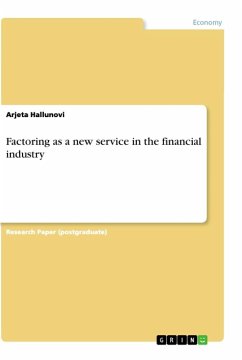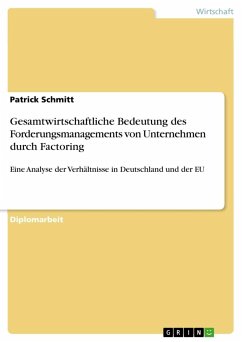Research Paper (postgraduate) from the year 2019 in the subject Economics - Finance, grade: 1,0, , language: English, abstract: This work focusses on factoring as a new service in the financial industry. Over the past fifteen years, an increasing number of small and medium-sized companies have begun to consider factoring as a practical source of working capital. Unfortunately, the availability of accurate information and time has not kept the same pace with the growing interest in this used form of funding. The financial sector, especially the banking sector, has been hit by the difficulties generated by the tensions of debt dependence, which are affecting the banking market assessment and its ability to create medium and long-term funds. Consequently, making a comparison with the past, in general, the most valued valuation methods are the cost of funds which have increased significantly. Current economic conditions, characterized by credit constraints, make factoring one of the most favorable solutions for businesses. This funding method is one of the ways it takes a short time to negotiate and one of the easiest methods to provide working capital funds.Factoring services offer an alternative to credit to companies that need little help with funds. By selling your receivables to a factoring company, you receive a portion of the forward amount and receive the rest, minus a percentage that the company receives as a payment as soon as the amount is collected. You get most of your funds before the customer has paid the account, instead of waiting until after paying the bill. The factoring service works to collect accounts receivable so that you can devote your resources and efforts elsewhere to your business. Through factoring, businesses can: enable their boards and senior management to make better informed decisions, proactively manage the provisions and effects on capital plans, make strategic decisions with a view to mitigating risks in the event of current underlying conditions, get assistance in understanding the evolving risk nature of the banking sector. Key words: Albania, Factoring, Services, Financial Institutions
Hinweis: Dieser Artikel kann nur an eine deutsche Lieferadresse ausgeliefert werden.
Hinweis: Dieser Artikel kann nur an eine deutsche Lieferadresse ausgeliefert werden.








